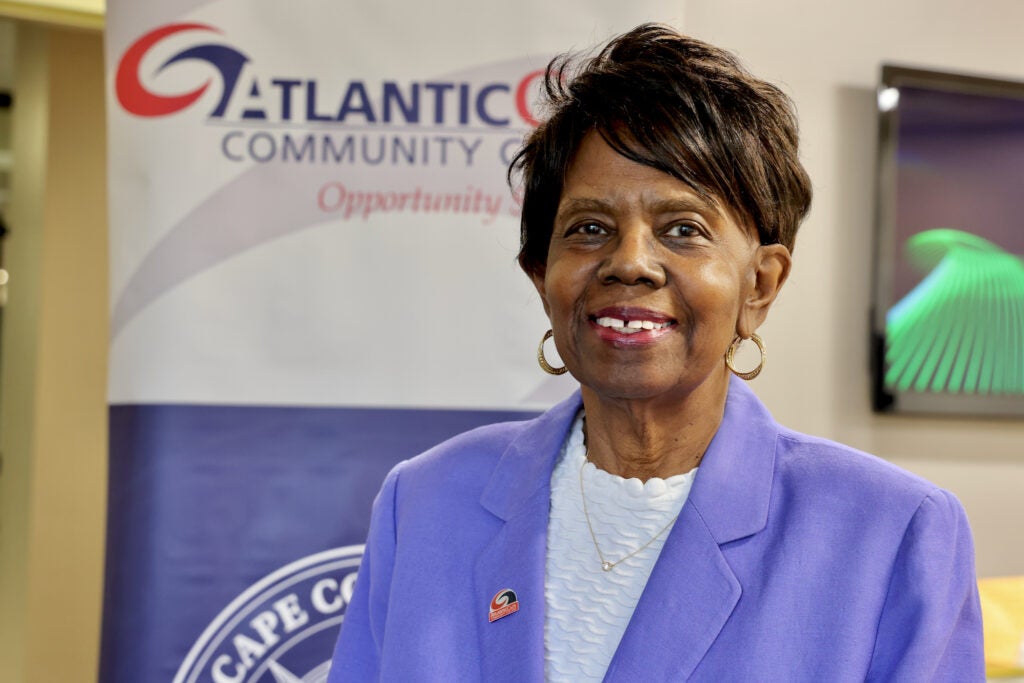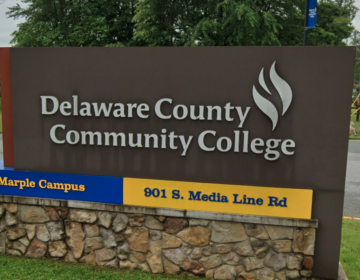New Jersey’s community colleges are fighting against proposed $20 million cut in state aid
Community colleges are fighting to keep money the Legislature added last year as the institutions try to keep tuition affordable.
Listen 5:23
Atlantic Cape Community College is spread over three locations in Atlantic and Cape May counties. It serves mostly first-generation college students and older adults, preparing them to enter the work force or to complete their bachelors degrees at a four-year state school like Rutgers or Thomas Edison. (Emma Lee/WHYY)
From Camden and Cherry Hill to Trenton and the Jersey Shore, what about life in New Jersey do you want WHYY News to cover? Let us know.
Gov. Phil Murphy plans to slash $20 million in state funding to community colleges. Educators, college administrators and students say this budget reduction would devastate students and the higher education community.
“That cut will have significant negative impacts on our colleges,” said Dr. Aaron Fichtner, president of the New Jersey Council of County Colleges. “Colleges will be forced to raise tuition, to cut programs, to cut services … our colleges are going to be struggling to make some very tough decisions that are going to have real impacts on students.”
As it now stands, state aid should account for a third of community college funding in the Garden State. Another third is supposed to come from the county or counties the colleges serve. The remainder of the funding should come from student tuition.
But Fichtner said, “[New Jersey] never lived up to those commitments,” adding that “tuition now accounts for 55% of the cost of running the colleges.”
That makes state aid even more important to the institutions as they work to keep tuition affordable.
New Jersey’s method for funding community college is not as complicated as the state’s formula for supporting public schools. It’s a single-line allocation in Gov. Phil Murphy’s budget proposal, which is divided among the state’s 18 community colleges.
Instead of economic factors such as tax revenue and local income, the state formula takes into account the following metrics: the number of students who have enrolled, the number of students who enrolled from lower-income populations receiving state and federal aid, the number of students who are from groups that have been underrepresented in higher education, and the number of students who are graduating.
This is in addition to ensuring that smaller institutions receive adequate funding.
“We are proud that our formula is now a performance-based formula,” Fichtner said. “It honors the vital role that our colleges play in enrollment, in enrolling adult students, in expanding access to higher education to helping students graduate.”
The amount of state aid community colleges will receive in 2025 will ultimately be decided between the governor and the two leaders of the Legislature by June’s end.
Murphy, while on WHYY News’ “Ask Governor Murphy” program on Wednesday, said he was “all in” on community colleges.
“They’re game changers for individuals and they are hugely important for economic development,” he said.
Murphy added he did not cut community college aid in his budget proposal. The amount he pitched this year is the same number he offered last year.
“The legislators last year added another $20 million,” he said. “There’s a notion of legislative adds, which is a long tradition in New Jersey.”
Community college leaders helped organize students from across the state to testify before Senate and Assembly committees, lobbying legislators to keep funding intact. The students shared their deeply personal stories and experiences at community colleges and how the education they received changed their lives.
During a March hearing before the Senate Budget Committee at the New Jersey Institute of Technology, Kaylie Quezada, a political science student at Bergen Community College, called choosing to go to community college one of her best life decisions.
“I recognized early on that I did not want to incur debt and worsen my family’s financial instability,” she said. “I also had access to resources such as a food pantry when feeling hungry after class, or after-track practices, emergency funding for bus passes, mental health counseling, advising for transferring and free professional clothing to represent Bergen as SGA president and an intern for Congressman Gottheimer.”
Expansion plans would be put on hold if cut goes through
Many community colleges say the limited funding puts a damper on their aspiration to grow.
Dr. Barbara Gaba, president of Atlantic Cape Community College, which serves Atlantic and Cape May counties, said the $1.4 million she would lose in state funding is “a big cut.”

“That’s something we did not expect and something that we did not plan for,” she said.
Gaba wants to expand two of Atlantic Cape’s known programs, culinary and nursing, to Cape May County. These programs are primarily based at the Mays Landing campus in Atlantic County, about 30 miles away.

But the proposed budget cut will delay those plans.
“Who’s going to teach the courses?” she asked. “That all has a ripple effect of you have to hire people to teach the courses.”

Get daily updates from WHYY News!
WHYY is your source for fact-based, in-depth journalism and information. As a nonprofit organization, we rely on financial support from readers like you. Please give today.







